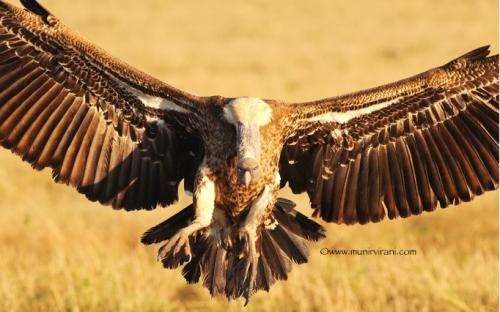How can we help endangered vultures?

Zoologists from the School of Natural Sciences at Trinity College Dublin are proposing an ingenious idea to help conserve populations of African white-backed vultures. The iconic birds, which play a critical role in sustaining healthy ecosystems, may need to dine for free in human-staffed 'vulture restaurants' if they are to survive spells of food scarcity in Swaziland and neighbouring countries.
Throughout Africa, vulture populations have suffered an alarming collapse in numbers in recent years. In rural parts of West Africa some species have declined by over 95%, while the famous Maasai Mara National Reserve has lost an average of 62% of its vultures over the past three decades. Aside from poisoning - both targeted and incidental - vultures are threatened by wind turbines, electricity pylons, habitat destruction, food loss and poaching.
Unlike most other vulture populations, the one in Swaziland is predicted to increase in size over the next few years, but, according to the zoologists' work, this will only happen if the birds get a helping hand in the form of a free dinner from time to time. As a result, they advocate creating 'vulture restaurants,' where people will need to provide food for the birds as a supplementary resource to their natural diet.
Dr Andrew Jackson, Assistant Professor in Zoology and Principal Investigator in the Trinity Centre for Biodiversity Research in the School of Natural Sciences at Trinity supervised the research. He said: "Creating vulture restaurants might seem a radical idea, but conserving any endangered animal is a very complicated task, and we might need to get creative to have the impact we want."
Attracting vultures to particular restaurants with well-stocked larders could also create unique opportunities to capture and tag the birds, which would provide invaluable data to help learn more valuable information about their foraging behavior, the zoologists said.
PhD Researcher in Zoology at Trinity, Adam Kane, is the lead author of the study, which has just been published online in the international, peer-reviewed journal Animal Conservation. He said: "It might sound funny to suggest dragging a huge carcass out into the field to feed these birds, but it's a similar idea to the one that sees us all fill our bird feeders with peanuts during the winter. These restaurants are already in use in South Africa where they are often used to monitor the health of the populations."
Because the breeding population in Swaziland comprises over 300 nesting pairs, it represents a key resource for conservationists. If the numbers continue to grow it is possible that some individuals will help boost populations in other countries that have been badly hit by the recent declines.
Vultures feed exclusively on carrion (they do not hunt live prey) but the availability of large animal carcasses, such as impala, wildebeest and zebra, is very unpredictable, which means the birds often fly long distances to find food. Furthermore, there are natural times of plenty and of scarcity owing to wet and dry seasons.
Outside of the breeding period, during the wet season, the birds have to fly into neighbouring countries to find enough to eat. This has worrying conservation implications because the vultures often stumble across poisoned food in unprotected regions.
Adam Kane added: "These birds can fly over 100 km in a single day, and may pass into neighbouring countries. This underscores the importance of having effective, coordinated conservation campaigns at an international level, because wild animals don't take heed of international borders."
The Trinity zoologists recently showed that vultures in other African countries rely on eagle-eyed birds of prey to find much of their food for them (see press release and accompanying video here). These birds of prey have keener eyesight, which helps them spot carrion from the skies, as well as sharper beaks, which can prep the food for vulture consumption. For this reason, the eagles act as unwitting waiters on the African plains.
Vultures play a key ecological role as recyclers of dead and decaying biomass and also provide an important service in reducing the risk of exposure to dangerous infectious diseases, such as anthrax.
Additionally, in the absence of vultures, feral and wild dogs that carry rabies can increase in number and pose a threat to humans, so it is vital that these birds are conserved - not only for their own sake, but also as providers of invaluable environmental services.
More information: Kane, A., Jackson, A. L., Monadjem, A., Colomer, M. A. and Margalida, A. (2014), "Carrion ecology modelling for vulture conservation: are vulture restaurants needed to sustain the densest breeding population of the African white-backed vulture?." Animal Conservation. doi: 10.1111/acv.12169
Provided by Trinity College Dublin




















